
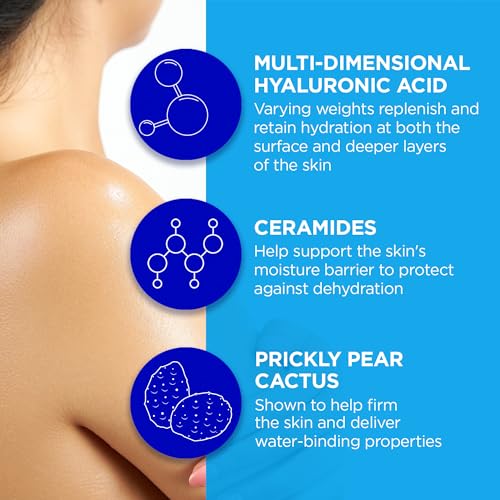
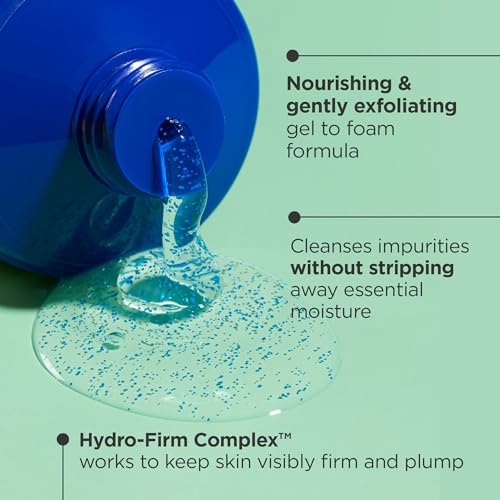
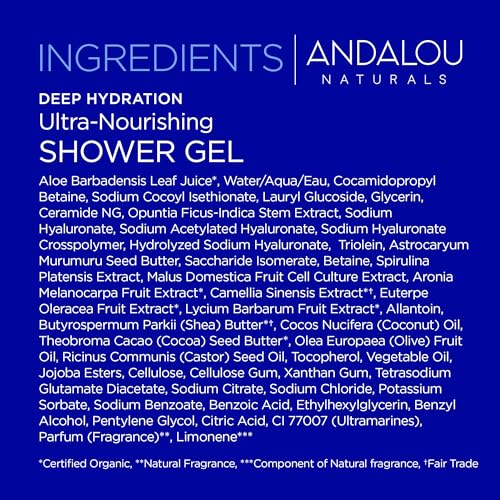
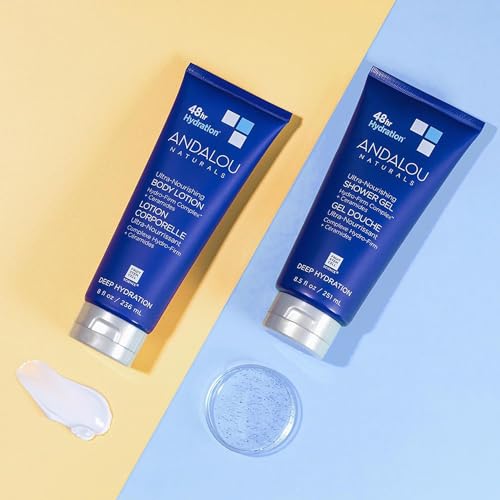
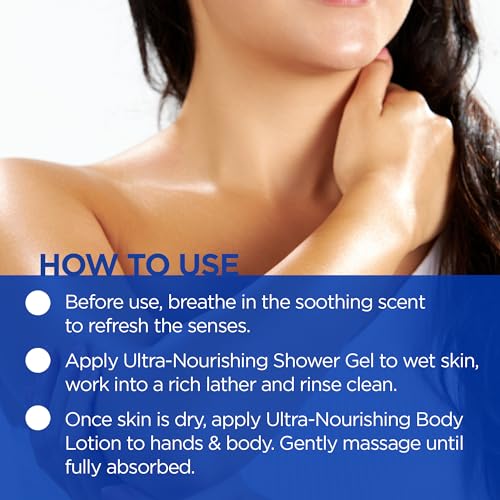
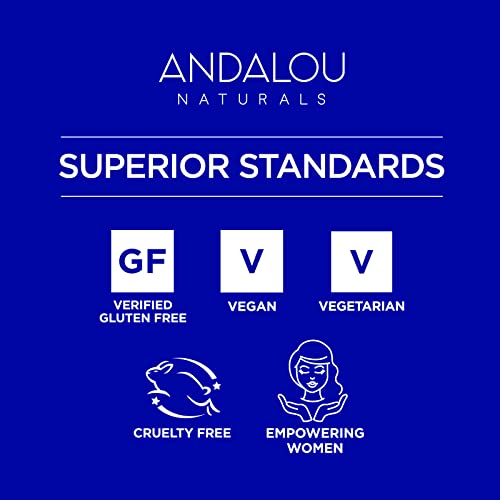
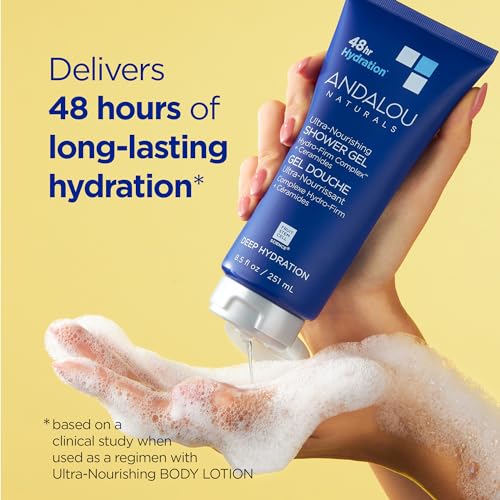
Andalou Naturals Body Wash - Deep Hydration, Vegan Formula with Hyaluronic Acid - 8.5 fl oz


Cocamidopropyl Betaine
High RiskCocamidopropyl betaine is a synthetic surfactant derived from coconut oil, commonly used in personal care products for its mild cleansing and foaming properties. It functions as a surfactant, emulsifier, and thickening agent, contributing to the texture and performance of formulations.
Sustai Insights
Cocamidopropyl betaine offers functional benefits as a gentle surfactant, enhancing product foaming and texture. However, it may pose low to moderate allergenic risks and is subject to high use restrictions due to contamination concerns. Regulatory bodies have advised on its safe levels of usage, categorizing its risk level as high overall. Users should practice caution, particularly with sensitive populations, and consider alternatives like naturally derived surfactants for safer formulations.
Spirulina Maxima (Algae) Extract
Medium RiskSpirulina maxima extract is an extract of the blue-green algae Spirulina maxima, commonly used in dietary supplements and cosmetics for its nutritional properties and potential skin benefits. It is rich in proteins, vitamins, and antioxidants, contributing to its functional applications in various formulations.
Sustai Insights
Spirulina maxima extract offers functional benefits, including nutritional support and antioxidant properties, making it popular in health products. It is recognized for being sustainably sourced and biodegradable. Health risks are minimal, with low concerns for carcinogenicity, allergies, and reproductive toxicity; however, contamination concerns persist. Regulatory bodies do not impose significant restrictions, indicating moderate risk overall. Safe usage practices are recommended, and alternatives include other algae extracts or plant-based ingredients.
Betaine
Medium RiskBetaine is a zwitterion (inner salt) commonly used in personal care and cosmetic products. It functions primarily as a humectant, aiding in moisture retention, and can also act as a surfactant, contributing to the cleansing properties of formulations.
Sustai Insights
Betaine is recognized for its effective moisturizing and surfactant properties, making it beneficial in enhancing product performance. It is generally considered low risk for health concerns such as carcinogenicity, allergies, and reproductive toxicity. However, there are multiple additive exposure sources to consider. Environmentally, it poses low risks regarding pollution and bioaccumulation. Regulatory status indicates it is approved for use with no significant restrictions. Overall, it presents a medium risk level, and safe usage practices should be observed. Alternatives include glycerin or sorbitol for similar benefits.
Opuntia Ficus Indica Stem Extract
Low RiskOpuntia ficus indica stem extract, derived from the prickly pear cactus, is utilized primarily for its moisturizing and soothing properties in cosmetic formulations. It is known for its potential to enhance skin hydration and provide antioxidant benefits.
Sustai Insights
Opuntia ficus indica stem extract offers functional benefits such as skin hydration and soothing effects, with sustainability credentials due to its renewable sourcing. Health risks are low, with no significant concerns regarding carcinogenicity, allergies, or reproductive toxicity. Environmentally, it poses minimal risk as a pollutant. Regulatory agencies do not currently restrict its use. Overall, the ingredient is assessed as low risk, making it a viable option in formulations.
Camellia Sinensis (Green Tea)
Low RiskCamellia sinensis, commonly known as green tea, is derived from the leaves of the Camellia sinensis plant. It is widely used in various products for its antioxidant properties and potential health benefits. Green tea is often included in skincare and dietary supplements for its perceived ability to promote skin health and overall well-being.
Sustai Insights
Green tea provides functional benefits as an antioxidant, potentially enhancing skin health and offering protective effects against oxidative stress. It is generally regarded as safe, with low risks for carcinogenicity, allergies, and reproductive toxicity. However, environmental impact assessments indicate minimal pollutant potential, and it is not bioaccumulative. Regulatory status shows no current restrictions. Overall, the risk level is low, and safe usage is recommended with no significant concerns noted. Alternatives include other herbal extracts with similar properties.
Vegetarian Glycerin
Low RiskVegetarian glycerin, also known as glycerol, is a colorless, odorless, and viscous liquid derived from plant sources. It is primarily used as a humectant, solvent, and emollient in various personal care products, helping to retain moisture and improve texture.
Sustai Insights
Vegetarian glycerin offers functional benefits as an effective humectant, promoting hydration and skin smoothness. It is biodegradable and typically sustainably sourced. Health risks associated with glycerin are low, with no significant concerns for carcinogenicity, allergens, or reproductive toxicity. Environmental risks are minimal, and it is not subject to major regulatory warnings. Overall, the risk level for this ingredient is low, making it a safe choice in formulations. Safe usage practices include ensuring proper concentrations in products, and alternatives such as propylene glycol exist but may have differing properties.
Saccharide Isomerate
Low RiskSaccharide isomerate is a carbohydrate complex derived from plant sources, primarily serving as a moisturizing agent in cosmetic and personal care formulations. It mimics the structure of natural carbohydrates found in the skin, enhancing hydration and improving skin barrier function.
Sustai Insights
Saccharide isomerate offers effective moisture retention and skin barrier enhancement, contributing to product efficacy. It is derived from renewable sources, supporting sustainability. Health risks are minimal, with low concerns for carcinogenicity, allergies, and reproductive toxicity. Environmental impact appears low, with no bioaccumulation or pollution risks identified. Regulatory status is favorable, with no significant warnings from agencies. Overall, the ingredient is assessed to pose low risk, making it a viable option in formulations.
Sodium Hyaluronate Crosspolymer
Low RiskSodium hyaluronate crosspolymer is a polymer of hyaluronic acid, utilized primarily for its ability to retain moisture and enhance product texture in cosmetic formulations. It acts as a humectant, drawing water into the skin and aiding in hydration and skin elasticity improvement.
Sustai Insights
Sodium hyaluronate crosspolymer is effective in moisture retention and improves product texture, offering functional benefits in skincare. It is considered low risk regarding health concerns such as carcinogenicity, allergies, and reproductive toxicity. Environmentally, it poses minimal risks, with no significant pollution or bioaccumulation noted. Regulatory bodies do not impose restrictions on its use. Safe usage practices involve adherence to recommended concentrations. Overall, the ingredient scores low for risk, making it a favorable option in cosmetic formulations.
Triolein
Low RiskTriolein is a triester of glycerin and oleic acid, primarily used in cosmetic formulations as an emollient and skin-conditioning agent. It serves to enhance product texture and provide moisture, making it beneficial for skin texture and hydration.
Sustai Insights
Triolein offers functional benefits as an effective emollient, contributing to skin hydration and texture enhancement. It is derived from natural sources, presenting some sustainability benefits. Health risks are minimal, with low concerns regarding carcinogenicity, allergies, or reproductive toxicity. Environmental risks are also low, as it is not considered a pollutant or bioaccumulative. Regulatory bodies do not impose significant restrictions on its use. Overall, due to its favorable profile, it is assessed as low risk, making it a viable ingredient in cosmetic products.
Hydrolyzed Sodium Hyaluronate
Low RiskHydrolyzed sodium hyaluronate is a salt form of hyaluronic acid, known for its ability to retain moisture. It is commonly used in cosmetic and skincare products as a humectant, helping to hydrate the skin by attracting and holding water molecules.
Sustai Insights
Hydrolyzed sodium hyaluronate provides significant functional benefits, including effective hydration and improved skin texture. It is not associated with major health risks, exhibiting low levels for carcinogenicity, allergies, and reproductive toxicity. Environmentally, it poses minimal risks and is not classified as a pollutant. Regulatory bodies do not impose any significant restrictions on its use. Overall, it is assessed as a low-risk ingredient, suitable for inclusion in various formulations.
Sodium Acetylated Hyaluronate
Low RiskSodium acetylated hyaluronate is an acetyl ester derivative of hyaluronic acid, primarily used in cosmetic formulations for its moisturizing properties. It helps to retain moisture in the skin, enhancing hydration and improving skin texture.
Sustai Insights
Sodium acetylated hyaluronate offers functional benefits as an effective humectant, contributing to skin hydration without significant health risks, as it is associated with low concerns for carcinogenicity, allergenic potential, and reproductive toxicity. Environmental impact appears minimal, with no significant pollutant potential or bioaccumulation. Regulatory assessments indicate it is not restricted in major markets, maintaining a low risk profile. Safe usage practices are advised, particularly for sensitive populations. Alternatives may include other hyaluronic acid derivatives or natural moisturizers, but overall, the ingredient is considered safe and effective.
Sodium Acetylhyaluronate
Low RiskSodium acetylhyaluronate is a sodium salt derivative of hyaluronic acid, commonly used in cosmetic formulations for its hydrating properties. It functions primarily as a humectant, attracting moisture to the skin and helping to maintain hydration levels in various personal care products.
Sustai Insights
Sodium acetylhyaluronate is recognized for its effective moisture-retaining properties, enhancing skin hydration and improving product texture. It has low health risks, with negligible concerns regarding carcinogenicity, allergies, or reproductive toxicity. Environmentally, it poses minimal risks and is not associated with significant pollution or bioaccumulation. Regulatory assessments indicate no current restrictions. Overall, it is considered low risk, making it a favorable ingredient in cosmetic formulations.
Ceramide Ap
Low RiskCeramide AP is a lipid molecule primarily used in cosmetic formulations to enhance skin barrier function and moisture retention. It mimics natural ceramides found in the skin, contributing to hydration and overall skin health.
Sustai Insights
Ceramide AP offers functional benefits by improving skin hydration and barrier function, making it valuable in skincare products. Its low risk profile indicates minimal health concerns such as carcinogenicity, allergies, and reproductive toxicity. Environmentally, it does not pose significant risks. Regulatory evaluations show no restrictions, supporting its safe use. Overall, the ingredient is assessed as low risk, with no major health or environmental concerns identified, suggesting it is a suitable option in cosmetic formulations.
Water
Low RiskWater is a clear, colorless liquid essential for various biological processes. It serves as a solvent in formulations, facilitating the dissolution of other ingredients and enhancing product texture and application. Additionally, water plays a crucial role in hydration and is a key component in many cosmetic and personal care products.
Sustai Insights
Water is an effective solvent and hydrator, contributing to the texture and efficacy of formulations. It is biodegradable and generally regarded as safe, with low concerns regarding carcinogenicity, allergies, and reproductive toxicity. However, excessive water usage can lead to environmental concerns, particularly regarding resource depletion. Regulatory bodies do not impose restrictions on water use in cosmetics. Overall, the risks associated with water are low, making it a safe and essential ingredient.
Caprylyl/ Capryl Glycoside
Low RiskCaprylyl/Capryl Glycoside is a surfactant derived from natural sources, primarily used in personal care and cosmetic products for its emulsifying properties. It helps to stabilize formulations and enhance cleaning efficacy while being gentle on the skin.
Sustai Insights
Caprylyl/Capryl Glycoside offers functional benefits as a mild surfactant and emulsifier, contributing to product stability without significant irritation. It is biodegradable and considered sustainably sourced. Health risks are low, with minimal concerns regarding carcinogenicity and developmental toxicity. Environmental impact is also low, as it does not accumulate in ecosystems. Regulatory assessments indicate no current restrictions. Overall, it presents a low risk profile, making it a suitable choice in formulations.
Sodium Cocoyl Isethionate
Low RiskSodium cocoyl isethionate is a surfactant derived from coconut oil, commonly used in cosmetic formulations. It functions as a cleansing and foaming agent, contributing to the texture and effectiveness of personal care products such as shampoos and body washes. It helps to remove dirt and oils from the skin and hair.
Sustai Insights
Sodium cocoyl isethionate offers functional benefits as a gentle surfactant that effectively cleanses without stripping moisture. It is biodegradable and derived from renewable sources, enhancing its sustainability profile. Health risks are low, with minimal potential for irritation or allergies noted. Regulatory bodies have not imposed significant restrictions, indicating a favorable risk assessment overall. Usage should be within recommended concentrations to maintain safety. Alternatives include milder surfactants like decyl glucoside for those seeking gentler options. Overall, the ingredient is assessed to have a low risk.
Malus Domestica Fruit Cell Culture Extract
Low RiskMalus domestica fruit cell culture extract, derived from apple fruit cell cultures, is primarily used in cosmetic formulations for its hydrating and antioxidant properties. It is incorporated to enhance skin health and improve the stability of products through its natural compounds.
Sustai Insights
Malus domestica fruit cell culture extract offers functional benefits such as hydration and antioxidant support, contributing positively to skin care. It is considered low risk regarding health concerns, including carcinogenicity and allergenic potential, with minimal environmental impact. Regulatory assessments indicate no significant restrictions. Safe usage practices should be followed, with alternatives like other botanical extracts available for similar benefits. Overall, the ingredient is assessed to have a low risk.
Astrocaryum Murumuru Seed Butter
Low RiskAstrocaryum murumuru seed butter is a natural fat extracted from the seeds of the Astrocaryum murumuru palm tree, primarily found in the Amazon rainforest. It is commonly used in cosmetic formulations for its moisturizing properties, acting as an emollient and skin-conditioning agent.
Sustai Insights
Astrocaryum murumuru seed butter offers functional benefits such as effective moisturization and skin conditioning, being sustainably sourced from the Amazon. Health risks are minimal, with low concerns for carcinogenicity, allergies, and reproductive toxicity. Environmental risks are also low, with no significant pollutant or bioaccumulation potential. Regulatory statuses are favorable, indicating no major restrictions. Overall, the ingredient presents a low risk, and safe usage practices include ensuring proper formulation concentrations. Alternatives like shea butter or cocoa butter may also be considered for similar benefits.
Opuntia Ficus Indica Stem Extract
Low RiskOpuntia ficus indica stem extract, derived from the prickly pear cactus, is utilized primarily for its moisturizing and soothing properties in cosmetic formulations. It is known for its potential to enhance skin hydration and provide antioxidant benefits.
Sustai Insights
Opuntia ficus indica stem extract offers functional benefits such as skin hydration and soothing effects, with sustainability credentials due to its renewable sourcing. Health risks are low, with no significant concerns regarding carcinogenicity, allergies, or reproductive toxicity. Environmentally, it poses minimal risk as a pollutant. Regulatory agencies do not currently restrict its use. Overall, the ingredient is assessed as low risk, making it a viable option in formulations.
Camellia Sinensis (Green Tea)
Low RiskCamellia sinensis, commonly known as green tea, is derived from the leaves of the Camellia sinensis plant. It is widely used in various products for its antioxidant properties and potential health benefits. Green tea is often included in skincare and dietary supplements for its perceived ability to promote skin health and overall well-being.
Sustai Insights
Green tea provides functional benefits as an antioxidant, potentially enhancing skin health and offering protective effects against oxidative stress. It is generally regarded as safe, with low risks for carcinogenicity, allergies, and reproductive toxicity. However, environmental impact assessments indicate minimal pollutant potential, and it is not bioaccumulative. Regulatory status shows no current restrictions. Overall, the risk level is low, and safe usage is recommended with no significant concerns noted. Alternatives include other herbal extracts with similar properties.
Vegetarian Glycerin
Low RiskVegetarian glycerin, also known as glycerol, is a colorless, odorless, and viscous liquid derived from plant sources. It is primarily used as a humectant, solvent, and emollient in various personal care products, helping to retain moisture and improve texture.
Sustai Insights
Vegetarian glycerin offers functional benefits as an effective humectant, promoting hydration and skin smoothness. It is biodegradable and typically sustainably sourced. Health risks associated with glycerin are low, with no significant concerns for carcinogenicity, allergens, or reproductive toxicity. Environmental risks are minimal, and it is not subject to major regulatory warnings. Overall, the risk level for this ingredient is low, making it a safe choice in formulations. Safe usage practices include ensuring proper concentrations in products, and alternatives such as propylene glycol exist but may have differing properties.
Spirulina Maxima (Algae) Extract
Medium RiskSpirulina maxima extract is an extract of the blue-green algae Spirulina maxima, commonly used in dietary supplements and cosmetics for its nutritional properties and potential skin benefits. It is rich in proteins, vitamins, and antioxidants, contributing to its functional applications in various formulations.
Sustai Insights
Spirulina maxima extract offers functional benefits, including nutritional support and antioxidant properties, making it popular in health products. It is recognized for being sustainably sourced and biodegradable. Health risks are minimal, with low concerns for carcinogenicity, allergies, and reproductive toxicity; however, contamination concerns persist. Regulatory bodies do not impose significant restrictions, indicating moderate risk overall. Safe usage practices are recommended, and alternatives include other algae extracts or plant-based ingredients.
Saccharide Isomerate
Low RiskSaccharide isomerate is a carbohydrate complex derived from plant sources, primarily serving as a moisturizing agent in cosmetic and personal care formulations. It mimics the structure of natural carbohydrates found in the skin, enhancing hydration and improving skin barrier function.
Sustai Insights
Saccharide isomerate offers effective moisture retention and skin barrier enhancement, contributing to product efficacy. It is derived from renewable sources, supporting sustainability. Health risks are minimal, with low concerns for carcinogenicity, allergies, and reproductive toxicity. Environmental impact appears low, with no bioaccumulation or pollution risks identified. Regulatory status is favorable, with no significant warnings from agencies. Overall, the ingredient is assessed to pose low risk, making it a viable option in formulations.
Betaine
Medium RiskBetaine is a zwitterion (inner salt) commonly used in personal care and cosmetic products. It functions primarily as a humectant, aiding in moisture retention, and can also act as a surfactant, contributing to the cleansing properties of formulations.
Sustai Insights
Betaine is recognized for its effective moisturizing and surfactant properties, making it beneficial in enhancing product performance. It is generally considered low risk for health concerns such as carcinogenicity, allergies, and reproductive toxicity. However, there are multiple additive exposure sources to consider. Environmentally, it poses low risks regarding pollution and bioaccumulation. Regulatory status indicates it is approved for use with no significant restrictions. Overall, it presents a medium risk level, and safe usage practices should be observed. Alternatives include glycerin or sorbitol for similar benefits.
Sodium Hyaluronate Crosspolymer
Low RiskSodium hyaluronate crosspolymer is a polymer of hyaluronic acid, utilized primarily for its ability to retain moisture and enhance product texture in cosmetic formulations. It acts as a humectant, drawing water into the skin and aiding in hydration and skin elasticity improvement.
Sustai Insights
Sodium hyaluronate crosspolymer is effective in moisture retention and improves product texture, offering functional benefits in skincare. It is considered low risk regarding health concerns such as carcinogenicity, allergies, and reproductive toxicity. Environmentally, it poses minimal risks, with no significant pollution or bioaccumulation noted. Regulatory bodies do not impose restrictions on its use. Safe usage practices involve adherence to recommended concentrations. Overall, the ingredient scores low for risk, making it a favorable option in cosmetic formulations.
Triolein
Low RiskTriolein is a triester of glycerin and oleic acid, primarily used in cosmetic formulations as an emollient and skin-conditioning agent. It serves to enhance product texture and provide moisture, making it beneficial for skin texture and hydration.
Sustai Insights
Triolein offers functional benefits as an effective emollient, contributing to skin hydration and texture enhancement. It is derived from natural sources, presenting some sustainability benefits. Health risks are minimal, with low concerns regarding carcinogenicity, allergies, or reproductive toxicity. Environmental risks are also low, as it is not considered a pollutant or bioaccumulative. Regulatory bodies do not impose significant restrictions on its use. Overall, due to its favorable profile, it is assessed as low risk, making it a viable ingredient in cosmetic products.
Cocamidopropyl Betaine
High RiskCocamidopropyl betaine is a synthetic surfactant derived from coconut oil, commonly used in personal care products for its mild cleansing and foaming properties. It functions as a surfactant, emulsifier, and thickening agent, contributing to the texture and performance of formulations.
Sustai Insights
Cocamidopropyl betaine offers functional benefits as a gentle surfactant, enhancing product foaming and texture. However, it may pose low to moderate allergenic risks and is subject to high use restrictions due to contamination concerns. Regulatory bodies have advised on its safe levels of usage, categorizing its risk level as high overall. Users should practice caution, particularly with sensitive populations, and consider alternatives like naturally derived surfactants for safer formulations.
Hydrolyzed Sodium Hyaluronate
Low RiskHydrolyzed sodium hyaluronate is a salt form of hyaluronic acid, known for its ability to retain moisture. It is commonly used in cosmetic and skincare products as a humectant, helping to hydrate the skin by attracting and holding water molecules.
Sustai Insights
Hydrolyzed sodium hyaluronate provides significant functional benefits, including effective hydration and improved skin texture. It is not associated with major health risks, exhibiting low levels for carcinogenicity, allergies, and reproductive toxicity. Environmentally, it poses minimal risks and is not classified as a pollutant. Regulatory bodies do not impose any significant restrictions on its use. Overall, it is assessed as a low-risk ingredient, suitable for inclusion in various formulations.
Sodium Acetylated Hyaluronate
Low RiskSodium acetylated hyaluronate is an acetyl ester derivative of hyaluronic acid, primarily used in cosmetic formulations for its moisturizing properties. It helps to retain moisture in the skin, enhancing hydration and improving skin texture.
Sustai Insights
Sodium acetylated hyaluronate offers functional benefits as an effective humectant, contributing to skin hydration without significant health risks, as it is associated with low concerns for carcinogenicity, allergenic potential, and reproductive toxicity. Environmental impact appears minimal, with no significant pollutant potential or bioaccumulation. Regulatory assessments indicate it is not restricted in major markets, maintaining a low risk profile. Safe usage practices are advised, particularly for sensitive populations. Alternatives may include other hyaluronic acid derivatives or natural moisturizers, but overall, the ingredient is considered safe and effective.
Sodium Acetylhyaluronate
Low RiskSodium acetylhyaluronate is a sodium salt derivative of hyaluronic acid, commonly used in cosmetic formulations for its hydrating properties. It functions primarily as a humectant, attracting moisture to the skin and helping to maintain hydration levels in various personal care products.
Sustai Insights
Sodium acetylhyaluronate is recognized for its effective moisture-retaining properties, enhancing skin hydration and improving product texture. It has low health risks, with negligible concerns regarding carcinogenicity, allergies, or reproductive toxicity. Environmentally, it poses minimal risks and is not associated with significant pollution or bioaccumulation. Regulatory assessments indicate no current restrictions. Overall, it is considered low risk, making it a favorable ingredient in cosmetic formulations.
Ceramide Ap
Low RiskCeramide AP is a lipid molecule primarily used in cosmetic formulations to enhance skin barrier function and moisture retention. It mimics natural ceramides found in the skin, contributing to hydration and overall skin health.
Sustai Insights
Ceramide AP offers functional benefits by improving skin hydration and barrier function, making it valuable in skincare products. Its low risk profile indicates minimal health concerns such as carcinogenicity, allergies, and reproductive toxicity. Environmentally, it does not pose significant risks. Regulatory evaluations show no restrictions, supporting its safe use. Overall, the ingredient is assessed as low risk, with no major health or environmental concerns identified, suggesting it is a suitable option in cosmetic formulations.
Water
Low RiskWater is a clear, colorless liquid essential for various biological processes. It serves as a solvent in formulations, facilitating the dissolution of other ingredients and enhancing product texture and application. Additionally, water plays a crucial role in hydration and is a key component in many cosmetic and personal care products.
Sustai Insights
Water is an effective solvent and hydrator, contributing to the texture and efficacy of formulations. It is biodegradable and generally regarded as safe, with low concerns regarding carcinogenicity, allergies, and reproductive toxicity. However, excessive water usage can lead to environmental concerns, particularly regarding resource depletion. Regulatory bodies do not impose restrictions on water use in cosmetics. Overall, the risks associated with water are low, making it a safe and essential ingredient.
Caprylyl/ Capryl Glycoside
Low RiskCaprylyl/Capryl Glycoside is a surfactant derived from natural sources, primarily used in personal care and cosmetic products for its emulsifying properties. It helps to stabilize formulations and enhance cleaning efficacy while being gentle on the skin.
Sustai Insights
Caprylyl/Capryl Glycoside offers functional benefits as a mild surfactant and emulsifier, contributing to product stability without significant irritation. It is biodegradable and considered sustainably sourced. Health risks are low, with minimal concerns regarding carcinogenicity and developmental toxicity. Environmental impact is also low, as it does not accumulate in ecosystems. Regulatory assessments indicate no current restrictions. Overall, it presents a low risk profile, making it a suitable choice in formulations.
Sodium Cocoyl Isethionate
Low RiskSodium cocoyl isethionate is a surfactant derived from coconut oil, commonly used in cosmetic formulations. It functions as a cleansing and foaming agent, contributing to the texture and effectiveness of personal care products such as shampoos and body washes. It helps to remove dirt and oils from the skin and hair.
Sustai Insights
Sodium cocoyl isethionate offers functional benefits as a gentle surfactant that effectively cleanses without stripping moisture. It is biodegradable and derived from renewable sources, enhancing its sustainability profile. Health risks are low, with minimal potential for irritation or allergies noted. Regulatory bodies have not imposed significant restrictions, indicating a favorable risk assessment overall. Usage should be within recommended concentrations to maintain safety. Alternatives include milder surfactants like decyl glucoside for those seeking gentler options. Overall, the ingredient is assessed to have a low risk.
Malus Domestica Fruit Cell Culture Extract
Low RiskMalus domestica fruit cell culture extract, derived from apple fruit cell cultures, is primarily used in cosmetic formulations for its hydrating and antioxidant properties. It is incorporated to enhance skin health and improve the stability of products through its natural compounds.
Sustai Insights
Malus domestica fruit cell culture extract offers functional benefits such as hydration and antioxidant support, contributing positively to skin care. It is considered low risk regarding health concerns, including carcinogenicity and allergenic potential, with minimal environmental impact. Regulatory assessments indicate no significant restrictions. Safe usage practices should be followed, with alternatives like other botanical extracts available for similar benefits. Overall, the ingredient is assessed to have a low risk.
Astrocaryum Murumuru Seed Butter
Low RiskAstrocaryum murumuru seed butter is a natural fat extracted from the seeds of the Astrocaryum murumuru palm tree, primarily found in the Amazon rainforest. It is commonly used in cosmetic formulations for its moisturizing properties, acting as an emollient and skin-conditioning agent.
Sustai Insights
Astrocaryum murumuru seed butter offers functional benefits such as effective moisturization and skin conditioning, being sustainably sourced from the Amazon. Health risks are minimal, with low concerns for carcinogenicity, allergies, and reproductive toxicity. Environmental risks are also low, with no significant pollutant or bioaccumulation potential. Regulatory statuses are favorable, indicating no major restrictions. Overall, the ingredient presents a low risk, and safe usage practices include ensuring proper formulation concentrations. Alternatives like shea butter or cocoa butter may also be considered for similar benefits.
Experience the revitalizing power of Andalou Naturals Body Wash, Deep Hydration Shower Gel. Crafted for those with dry skin, this ultra-nourishing gel combines Hyaluronic Acid and Ceramides to deliver 48 hours of hydration, leaving your skin soft and glowing.
- Deep Cleansing & Hydration: Gently wash away impurities while retaining essential moisture, ensuring skin feels clean and nourished.
- Vegan & Natural Ingredients: Formulated with cruelty-free practices, free from harmful chemicals like sulfates and parabens, promoting healthy skin without compromise.
- Refreshing Aromatherapy: Infused with the invigorating scents of coastal trees and sea salt, transforming your daily shower into a soothing ritual.
- Gentle Exfoliation: Features natural exfoliants that rejuvenate dry skin, revealing a smoother texture with every use.
- Fruit Stem Cell Science: Harnesses nature's antioxidants to support skin health, making it a perfect choice for eco-conscious consumers seeking effective skincare.
Subscribe & Save with Sustai
- Best Price Guarantee: Always enjoy the lowest prices on sustainable home essentials.
- No Surprises: We’ll notify you before shipping. No hidden fees, ever.
- You’re in Charge: Change, pause, or cancel your subscription anytime with ease.
- Eco-Friendly Deliveries: Our grouped shipments mean less packaging and lower emissions.
Join us on a sustainable journey. Special offers for a limited time! Prices and promotions may change.
Recommended Products
Experience the revitalizing power of Andalou Naturals Body Wash, Deep Hydration Shower Gel. Crafted for those with dry skin, this ultra-nourishing gel combines Hyaluronic Acid and Ceramides to deliver 48 hours of hydration, leaving your skin soft and glowing.
- Deep Cleansing & Hydration: Gently wash away impurities while retaining essential moisture, ensuring skin feels clean and nourished.
- Vegan & Natural Ingredients: Formulated with cruelty-free practices, free from harmful chemicals like sulfates and parabens, promoting healthy skin without compromise.
- Refreshing Aromatherapy: Infused with the invigorating scents of coastal trees and sea salt, transforming your daily shower into a soothing ritual.
- Gentle Exfoliation: Features natural exfoliants that rejuvenate dry skin, revealing a smoother texture with every use.
- Fruit Stem Cell Science: Harnesses nature's antioxidants to support skin health, making it a perfect choice for eco-conscious consumers seeking effective skincare.

You can have at most 2 Sustainable Steals products in your cart
Customer Reviews
Customers’ View
Customers appreciate the deep hydration and gentle cleansing properties of this body wash, noting that it effectively moisturizes without causing dryness. Many users highlight the product's pleasant, subtle scent and its ability to leave skin feeling noticeably smoother after use. Reviews emphasize that the formulation is suitable for sensitive skin, with several customers reporting no irritation or itching, even with frequent use. Additionally, the commitment to clean and eco-friendly ingredients, including a vegan formula free from parabens and sulfates, resonates well with health-conscious consumers. Overall, customers find this product to be an effective, affordable alternative to higher-priced options while aligning with their values of sustainability and wellness.
AI-generated from the text of customer reviewsThis product is rated 5.0 of 5.0 stars.
It has received 4 reviews.





